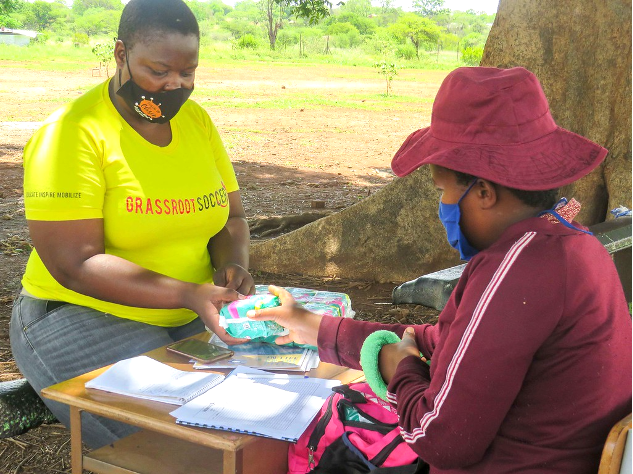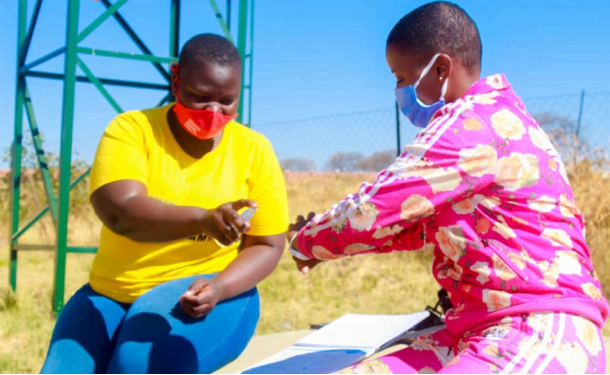Youth Reproductive Health Assistants as Essential Workers: Reaching Adolescents in Zimbabwe During COVID-19

The United Nations Population Fund (UNFPA) estimates that 12 million women globally have experienced contraceptive interruptions since the beginning of the COVID-19 pandemic, which is projected to lead to 1.4 million unintended pregnancies. For adolescents, the consequences of unintended pregnancies are particularly high; they make it harder to finish school and put adolescent girls at greater risk of HIV infection and pregnancy-related complications, which is the leading cause of death globally for girls aged 15-19.
When the weight of the pandemic strained Zimbabwe’s health systems, adolescents’ access to sexual and reproductive health and rights (SRHR) services and information became even more limited. To address these heightened barriers, Grassroot Soccer (GRS) stepped in with a flexible and creative solution.
In Zimbabwe, a number of young adult mentor GRS Coaches, who deliver play- and evidence-based health programs to youth through GRS’s SKILLZ curricula, also receive training to serve as Youth Reproductive Health Assistants (YRHAs). Stationed within their communities, YRHAs deliver comprehensive, youth-friendly SRHR information to adolescents; offer counselling on contraceptive options; provide short-term contraception and other health products; and facilitate referrals to long-acting reversible contraception (LARCs) and other clinic-based services.
The program was originally launched as a pilot in 2019, but when the pandemic set in, GRS realized the potential for YRHAs to address service gaps exacerbated by COVID-19, and scaled the program accordingly. In partnership with the Zimbabwe National Family Planning Council, GRS trained a cohort of 40 Coaches to be YRHAs in 2020. The Zimbabwean Ministry of Health then classified YRHAs as essential healthcare workers, which allowed them to engage adolescents even during school closures and lockdowns.
Evidence shows that YRHAs are making a difference in the lives of the young Zimbabweans they are reaching. Despite the disruptions to adolescent health services caused by COVID-19, GRS participants’ access to and uptake of contraceptive services were actually maintained and enhanced in Zimbabwe during 2020. With the expansion of the YRHA program, contraceptive use amongst female participants in GRS programs went up 250% from 2019 to 2020.
One such YRHA who has continued to engage adolescents during the pandemic is Thubelihle, a 27-year-old GRS Coach from Bulawayo, Zimbabwe. When Thubelihle was a teenager, a lack of SRHR information and access to family-planning resources contributed to an unplanned pregnancy, which caused her to drop out of school. “This was the story of my life,” said Thubelihle, who then focused on sharing her story with young people in her community, “hoping they would not make the mistake that I had.”

After joining GRS as a Coach, Thubelihle had the chance to train as a YRHA and jumped at the opportunity to bring crucial SRHR information to a wider network of young people, parents, and community leaders.
“Lack of information has always driven us young people to make the ill-informed decision, and I am glad that I am only a stone’s throw away from many young people,” Thubelihle said. “[As a YRHA], I can easily provide them with information and facilitate access to [contraceptives]…I am now a game-changer in my community [and] the youths are now able to access family planning methods without being judged.”
Through training GRS Coaches as YRHAs, GRS is helping strengthen communities’ capacity to provide services to young people and create safe spaces for openly discussing social norms and taboos around gender, sexuality, and SRHR. In particular, the success of training Coaches as frontline health workers demonstrates how bringing SRHR out of health facilities, away from overburdened community health workers, and into communities in youth-friendly ways can have a meaningful impact on young people.
“[I’m] creating a supportive environment for young people to reach their full potential,” said Norleen, another YRHA. “Bringing positive change in people’s lives is one of the best things that ever happened to me.”

